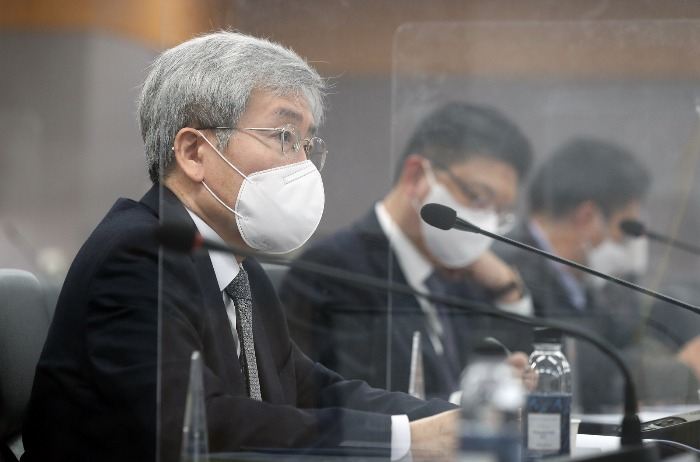
Chairman of the Financial Services Commission (FSC) Koh Seungbeom
The Financial Services Commission (FSC) and the Korea Exchange (KRX) jointly announced a revision to the corporate governance report guidelines on Sunday. Starting May, certain public companies that wish to carve out a business unit to create a new entity and go through double listing on the Korea Exchange must provide a minority shareholder protection clause in their annual corporate governance reports. The revision applies to all Kospi-listed companies of over 1 trillion won ($822 million) in assets. The creation of a new accounting entity from an exsiting company's department is a popular spinoff tactic used in South Korea, Japan, and Taiwan. The parent company would still have 100% ownership of the new affiliate.The protection clause needs to encompass whether the company listened to the opinions of the minority shareholders and how it plans to protect the rights of dissenting opinion holders. Even if the listed company does not follow through with the measures stated in the reports, however, they will not be subject to the full penalty of law.LEGAL FRAMEWORK As such, Seoul will prepare a legal framework separate from the guideline – meaning it will regulate the negative side effects from such spinoffs by law. As early as next month, the Financial Services Commission plans to announce the basics of the new legal framework after close consultations with experts, related organizations, and industry insiders. “While we devise a way to improve the system's fundamentals, our priority will be on encouraging companies and shareholders to adjust their interests on their own,” Seoul’s top financial watchdog said.
Kospi ended Friday's trade at 900.96 won, 1.25% lower than the previous close.With only a month left until the legal framework is estalished, why did the FSC rush to announce the guidelines on Sunday?To much dismay of minority shareholders, South Korean conglomerates have been carrying out such spinoffs in recent years.The differing – sometimes heated – opinions on the corporate actions have made headlines in the world's 10th largest economy.Since 2020, Kospi's large cap companies have taken advantage of the bullish stock market for financing.The companies said such spinoffs and the following double listings on Kospi are the only ways they can raise large amounts of funds without diluting the shares of the controlling shareholder. They claimed the initial public offerings are integral to starting new businesses.Minority shareholders, for their parts, said they are victims of such decisions after shares of some parent companies have plummeted since creating wholly owned affiliates and listing them on the same stock exchange. Because of the nature of the spinoffs that establish an affiliate from an existing business department, the current shareholders of a parent company are not eligible for a new entity’s stocks. For example, when LG Chem Ltd. launched its battery affiliate dubbed LG Energy Solution Ltd. in late 2020, the shareholders of the parent company did not receive any stocks of the new entity.
Founded in December 2020, LG Energy Solution manufactures storage batteriesMinority shareholders have complained that such corporate split and the following double listing is an illogical system that is not in line with international protocols. These are some of the measures currently being discussed by the industry: Granting shares of newly-listed affiliates to existing shareholders of the parent companies, giving priority access to the affiliates’ initial public offerings to shareholders of the parent firms, and giving appraisal rights to dissenting shareholders. Ahead of the 8th presidential election slated for March 9, candidates have also shared how they would revise the regulations on the controversial practice.South Korea’s top financial regulator also announced measures to a more stringent corporate disclosure – such as requiring companies to share their policy and methods of choosing the chief executives in detail. Previously, public firms only had to list the procedures they use to select their top managers. Going forward, a company needs to detail the status of its chief executive succession policy in its governance report; inclusive of how it selects the candidates and operates the training and evaluations for them. The Corporate Governance Report Disclosure System was first introduced in March 2017 targeting Kospi-listed companies to improve transparency in corporate management and to reinforce the market’s vigilance upon public companies. Since 2019, listed companies of at least 2 trillion won in assets have been required to submit and disclose their corporate governance reports to the KRX.From this year, listed companies of at least 1 trillion won in assets are subject to the requirement. Seoul plans to subject all listed companies to the disclosure system by 2026. By Eui-Myung Parkuimyung@hankyung.comJee Abbey Lee edited this article.